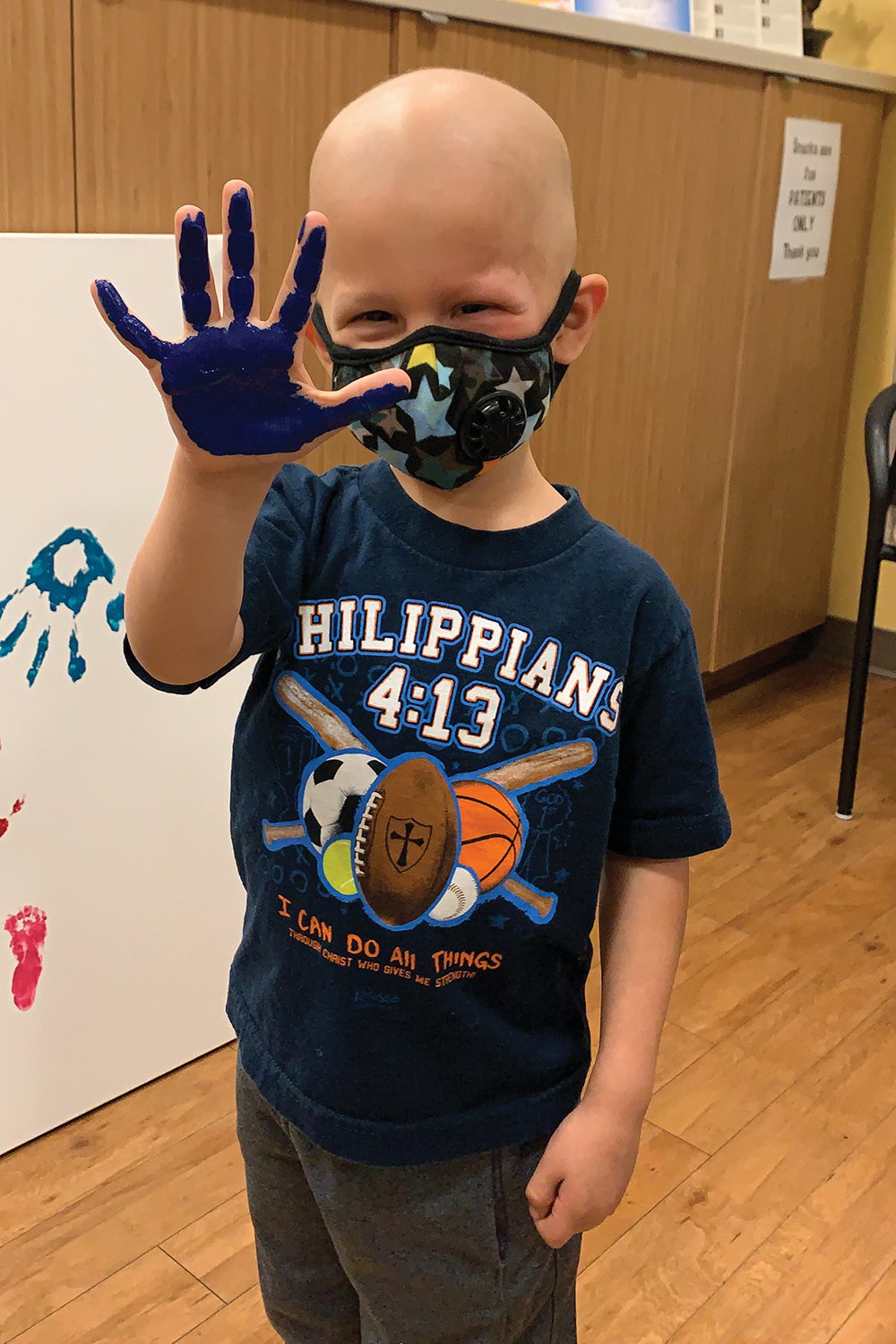I never knew that gold is the ribbon color representing Childhood Cancer. I never knew that September is Childhood Cancer Awareness Month. I never knew how many kids in the Dallas Fort-Worth Metroplex currently have or previously had cancer. I never knew that childhood cancer was the number one cause of death by disease. I never knew, at least until it hit my home and made itself welcome inside my son, Evan’s, body.
On the evening before Thanksgiving 2019, we heard the dreaded words from our child’s ophthalmologist, “There is a mass behind his eye. It looks to be indicative of a cancer, but the only definitive way to know is to get a biopsy. You need to go to the emergency room. Time is of the essence.” That evening we sat in the emergency room in a small sterile white room filled with machines, monitors, two chairs and a single bed squeezed into the room. The doctors came in to tell us that they had the MRI images uploaded and that their radiologist suspected Rhabdomyosarcoma.
Thanksgiving Day we decided to pack our bags and drive to Houston to see if we had better luck in finding a surgeon. To our blessing and surprise, people were working behind the scenes to coordinate the Ophthalmologists, the Oculoplastic Surgeon and the Oncology team. The results came in: the biopsy revealed that the mass behind my son’s eye was in fact a malignant tumor. He was diagnosed with a rare childhood cancer known as Embryonal Rhabdomyosarcoma. I immediately got plugged into all the pediatric cancer groups and quickly learned about the ‘More than Four’ movement.

‘More than Four’ is a movement that is bringing awareness to the funding by the National Cancer Institute for Research in Pediatric Cancer. Every day, 43 children are diagnosed with cancer in the United States and just under four percent of funding goes to researching the biology of each type of cancer, both solid tumors and blood cancer. It also has to cover the expense of short- and long-term effects of treatment.
Most children who are diagnosed with cancer are misdiagnosed for several weeks, even months. By then, the cancer has metastasized, which directly impacts the chance of effectively treating cancer and using fewer toxic measures. According to St. Baldrick’s Foundation, adults are more easily diagnosed in early stages of cancer while 80 percent of children receive a diagnosis of cancer after metastasis has occurred.
Pharmaceutical companies fund about 60 percent of drug development for adult cancer and next to none for childhood cancer, according to St. Baldrick’s. The drugs used to treat adults are not the same as the ones children receive, therefore the lack of funding drugs to combat childhood cancer is to the detriment of our kids.
For the children who are able to beat cancer, they may have won the battle but not necessarily the war. Not only is there real risk of relapse, but 95 percent of childhood cancer survivors will have a lifetime of long-term side effects to cope with.
Children aren’t supposed to get cancer, but they do. Children should have a better chance for safer medications and improved long-term side effect management, but they don’t. And four percent of the National Institute of Cancer is not enough and neither is the lack of funding from pharmaceutical companies. Funding is needed to help children mitigate some of the physical, psychological, social and potential developmental issues that they will continue to confront every day for the rest of their lives.
How You Can Help
Donating to foundations like Alex’s Lemonade Stand Foundation, the St. Baldrick’s Foundation and the National Pediatric Cancer Foundation, as well as spreading awareness helps tremendously! As more and more people learn about the ‘More Than Four’ movement, word gets out and laws can be changed. Cancer children deserve not only to live, but to live a better quality of life.
Adriana Lewin is a Licensed Professional Counselor, founder of Grace to Heal Counseling and Family Chemotherapy. After six weeks of radiation and 42 weeks of chemotherapy, Evan is considered to be NED (No Evidence of Disease).







